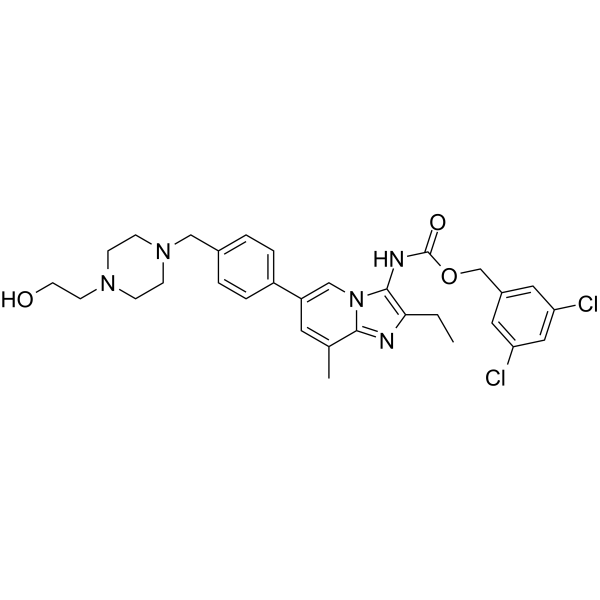| In Vitro |
ATX inhibitor 13 (compound 10c) (0-20 μM, 72 h) shows cytotoxicity and anti-proliferative activity against MCF-7, MDA-MB-231, A549, NCI-H1581, H2228, Hep3B, and RAW264.7 cells[1]. ATX inhibitor 13 (0-1 μM, 0-72 h) inhibits migration of RAW264.7 cells in a dose-dependent manner, significantly down-regulates both the colony count and colony single area with the concentration elevation[1]. ATX inhibitor 13 (0-1 μM, 72 h) dose dependently suppresses colony formation of RAW264.7 cells[1]. ATX inhibitor 13 (0-1 μM, 48 h) induces weak apoptosis in a dose-dependent manner in RAW264.7 cells[1]. ATX inhibitor 13 (0-1 μM, 48 h) brings G2 phase arrest of RAW264.7 cells[1]. Cell Proliferation Assay Cell Line: MCF-7, MDA-MB-231, A549, NCI-H1581, H2228, Hep3B, RAW264.7[1] Concentration: 0-20 μM Incubation Time: 72 h Result: Showed cytotoxicity and antiproliferative activity against MCF-7, MDA-MB-231, A549, NCI-H1581, H2228, Hep3B, and RAW264.7 cell lines, with IC50 values of 3.87 ± 0.37, 3.29 ± 0.37, 6.59 ± 0.26, 4.76 ± 0.57, 4.27 ± 0.21, 0.58 ± 0.11, and 0.63 ± 0.26 μM. Apoptosis Analysis Cell Line: RAW264.7 cells[1] Concentration: 0 μM, 0.1 μM, 0.25 μM, 0.5 μM and 1 μM Incubation Time: 48 h Result: Induced apoptosis in a dose-dependent manner, with the apoptotic rates of 6.48% (0.1 μM), 7.73% (0.25 μM), 8.60% (0.5 μM) and 9.17% (1 μM). Cell Cycle Analysis Cell Line: RAW264.7 cells[1] Concentration: 0 μM, 0.1 μM, 0.25 μM, 0.5 μM and 1 μM Incubation Time: 24 h Result: Led to significant G2 phase arrest in RAW264.7 cells in a dose-dependent manner, the percentage of cells in the G2 phase slightly increased from 10.90% to 90.16% (0-1 μM).
|
| In Vivo |
ATX inhibitor 13 (compound 10c) (C57BL/6J mice, 0-1000 mg/kg, Orally, once) has an acceptable safety profile[1]. Animal Model: C57BL/6J mice (5 groups,4 mice per group)[1] Dosage: 5000, 3200, 2500 and 1000 mg/kg Administration: Orally, once Result: Had an acceptable safety profile, showed no obvious safety concerns.
|
